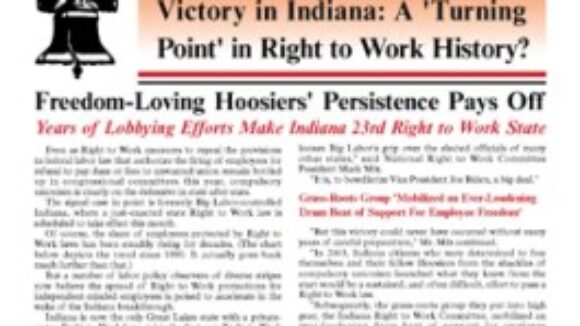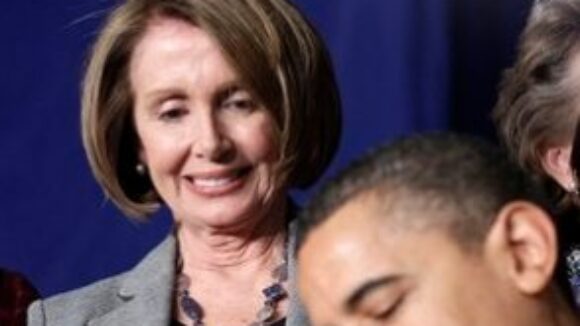Unionized Officers Win Refunds in Free Speech Rights Suit
From the National Right to Work Legal Defense Foundation: New York public employees desperately need Right to Work protections Rochester, NY (April 24, 2012) –…

From the National Right to Work Legal Defense Foundation: New York public employees desperately need Right to Work protections Rochester, NY (April 24, 2012) –…

March National Right to Work Committee newsletter Special Supplement online Here’s a quote: Abby Rapoport, a staff writer for the pro-forced unionism American Prospect, fears the…

March National Right to Work Committee newsletter Special Supplement online Here’s a quote: Abby Rapoport, a staff writer for the pro-forced unionism American Prospect, fears the…

The Investors Business Daily nails it -- the union bosses hate and fear Wisconsin Gov. Scott Walker because his plan is working and is a model for other states seeking to balance their budgets: Backed by a massive, well-financed Big Labor machine, the Democratic Party is determined to reverse the democratic election of Wisconsin Republican Gov. Scott Walker. His crime? Fixing his state's economy. Democrats and their powerful [forced-dues funded] union allies got the more than half a million signatures needed to hold a recall ballot intended to remove Walker, a Republican elected in November 2010. The vote will be in just over two months. Or did they? "Adolf Hitler" and "Mick E. Mous" were successfully weeded out — plus tens of thousands of other invalid entries. But ABC-TV's Milwaukee affiliate was told by a man on the street that "I think I signed about 80 times" over two weeks. How many others like him were there? There have been two successful recall movements in American history. California Gov. Gray Davis, responsible for California's unprecedented electricity crisis, was replaced by movie star Arnold Schwarzenegger in 2003. And 1921 saw the grass-roots ousting of North Dakota Gov. Lynn Frazier, whose state takeover of farm-related industries rendered the state bank insolvent. [Unlike those recalls] The Wisconsin recall would undo the election not of someone who has been resoundingly successful, not who wrecked his state's economy. [Forced-dues] muscle, not popular discontent, is driving this movement. On taking office, Walker made it clear he meant business and dared to squash the unholy trinity of Big Labor, politicians and money, which poses such a danger to the entire nation. He had the guts to say, "Collective bargaining isn't a right; it is an expensive entitlement." Acting on that principle, Walker balanced a $3.6 billion budget deficit without raising taxes, reduced the tax burden on entrepreneurs, reformed regulation and instituted what he calls "the most aggressive tort reform in the country" against frivolous lawsuits targeting businesses. Is it a coincidence that Wisconsin unemployment is its lowest since 2008? Did Walker devastate state government? Quite the contrary. His clampdown on collective bargaining ended seniority and tenure for public school teachers, replacing them with hiring and firing — and pay — based on performance. He gave each of the 300,000 Wisconsin state workers the right to choose on union membership — and financing Big Labor's political activities through dues. Speaking before the Conservative Political Action Conference in Washington in February, Walker emphasized why he is being targeted: "The big government union bosses are worried that workers may actually choose to keep the money for themselves." This explains the tens of millions of dollars they spent last summer on six Wisconsin state Senate recall elections.
It’s a coin operated world when SEIU militants use forced-union-dues handed out in brown envelopes to pay protesters in front of the U.S. Supreme Court. The Daily Caller has the evidence: …

We are all following Big Labor’s unprecedented attempt to buy a new governor and senate in Wisconsin. Gov. Scott Walker believe the union bosses will unload $70 to $80 million on the state before election day. While union militants…

After a nearly four-hour debate, in a committee room ringed by chanting union members, a Senate committee voted 7-6 to refer the Right to Work constitutional amendment to its next stop at the Senate Rules Committee. Needless to say, the union…

Michigan dials back Big Labor arrogance and power — at least slightly — the legislature passed a bill to prohibit public schools from automatically collecting union dues from the paychecks…

The latest poll driven rhetoric from the union bosses is the claim that union compulsion should be a civil right under color of law. Anthony Davies, a professor at Duquesne University looks behind the rhetoric noting that the problem with Big Labor's proposed law because it makes compulsory unionism a 'right' for Big Labor while taking away from employees' freedom to not join or be compelled to pay tribute to a union boss. A recent op-ed in The New York Times called for new labor laws that will ensure that workers have the right to organize labor unions. These laws already exist, so what are unions griping about? It’s not that workers are being prevented from unionizing. The problem, as unions see it, is that it is too difficult to force workers to unionize. Free workers have weighed the costs and benefits of today’s unions and most have freely chosen to do without them. It is this free will that unions — and their advocates on the country’s op-ed pages — seek to quash. Union membership in the private sector has fallen to 7% not because unions have failed, but because they have done so well that — at least for the present — they are no longer needed. The exploitation of employees by their employers is a thing of the past; in fact, nowadays it seems like we’re more likely to hear about union bosses exploiting union members than about employers exploiting employees. Today, no matter how much labor leaders and their advocates pretend otherwise, labor reform means reforming unions.